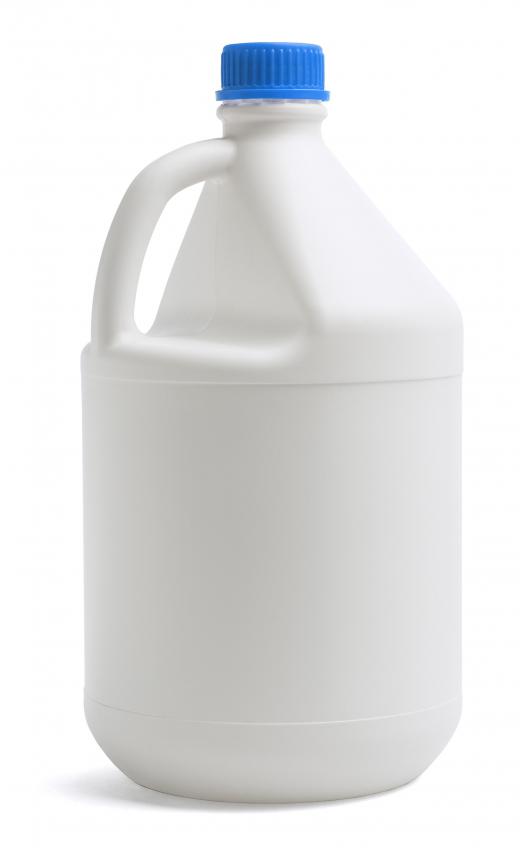What Are Bacterial Spores?
 Mary McMahon
Mary McMahon
Bacterial spores are extremely resilient copies of genetic material bacteria can use to survive harsh conditions. They allow organisms to enter a dormant state when exposed to hostile environments. Once the environmental pressures decline, the spores can activate, allowing the bacteria to start reproducing again. Not all bacteria are capable of forming spores, but some well-known pathogens like anthrax, tetanus, and botulism do, making them a topic of interest and concern for medical researchers.
Organisms can start forming spores in response to specific environmental pressures, like a decline in water supply, rising temperatures, or radiation. It takes several hours to form bacterial spores and whole colonies cannot survive these conditions, but some tough individuals may be able to sporulate in time to protect themselves. The organisms make a copy of their genetic material and trap it inside a tough capsule within the cell membrane. Multiple layers of material surround the spore, increasing the chances of survival.

Radiation, high heat, and extreme dryness do not damage bacterial spores. They also resist treatment with bactericides. This can pose a significant threat to human health and safety in the case of pathogenic organisms, because they can survive most measures used to reduce infection. Swabbing down surfaces with bactericidal soaps, for example, may leave bacterial spores intact. Likewise, irradiation of food products wouldn’t destroy spores.
To kill spores, it is usually necessary to provide prolonged content with a chemical compound that can attack the bacterial cell walls and destroy the genetic material inside. A 10% bleach solution, if left in contact with bacterial spores for at least five minutes, can be an effective decontamination method. Some spores can survive even outside this window, illustrating the hardiness of these structures. Adding spore formation to their life cycle allowed a number of organisms to endure very tough environmental conditions that would have been too harsh for other organisms.
Research on spores examines both how they form, and how they can be addressed if they are created by organisms known to cause disease. This requires carefully controlled environments to trigger spore formation and expose spores to different hazards. These can help research determine what will reliably kill bacterial spores so they can make infection protocol recommendations. Developers of bactericides for environments like hospitals and research facilities also need to stay one step ahead of their targets, as these organisms are highly adaptable and can develop resistance to cleaning solutions over time.
AS FEATURED ON:
AS FEATURED ON:











Discussion Comments
@HuggingKit-- A spore is any one-cell body that is resistant to harsh conditions and can form into something else. So it is not a specific body to bacteria. Like you said, there are also fungi spores.
All spores are dangerous because they are so difficult to get rid of. This is also why people have so many issues with mold in their homes and also why bacteria causing illnesses like tetanus are so dangerous. Bleach seems to be one of the few things that can actually kill them. It's used by home-owners when dealing with stubborn mold growth in basements. It's also used for other cleaning needs when there is someone carrying a permanent bacterial infection in the home, such as hepatitis B.
Unfortunately though, bleach is also toxic to us and inhaling its fumes and coming into contact physically can be very dangerous for us. It's important to dilute bleach when using and also to wear a mask and gloves for protection. The home must be well ventilated to dissipate the bleach fumes as quickly as possible.
Isn't it in the interest of cleaning product manufacturers to invest in this research? They stand to lose too. If word gets out that our favorite household cleaner can't actually kill germs, obviously that will affect sales negatively.
Bacterial spores are very scary. Resistance to antibiotics is already a growing issue in terms of treating bacterial infections. If the number of infectious bacteria that can form protective spores like this increase, it can be detrimental for animals and humans. If bacteria can survive the harshest of conditions and revive at a later time, we can't ever wipe out these infections entirely. Some people think that viruses are more dangerous than bacteria. But some of the biggest and deadliest epidemics on earth have been due to bacteria. So this is a real danger and our scientists and doctors need to find a way to disrupt the spore forming mechanism of bacteria.
@HuggingKit- There are differences; mold spores are fungal, and you can usually kill mold and mildew with bleach or strong cleaners. Bacterial spores are stronger, harder to kill, and are more likely to make you sick,
But, you're right both types can be bad for your health if you have them in your home and breathe them.
Are mold spores the same as bacteria spores, or are they something different? I know both can make you very sick. We've had professionals come in and check our home for mold. I'm a bit of a worrier when it comes to things such as these.
Post your comments